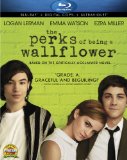| Reviews & Columns |
|
Reviews DVD TV on DVD Blu-ray 4K UHD International DVDs In Theaters Reviews by Studio Video Games Features Collector Series DVDs Easter Egg Database Interviews DVD Talk Radio Feature Articles Columns Anime Talk DVD Savant Horror DVDs The M.O.D. Squad Art House HD Talk Silent DVD
|
DVD Talk Forum |
|
|
| Resources |
|
DVD Price Search Customer Service #'s RCE Info Links |
|
Columns
|
|
|
Perks of Being a Wallflower, The
Summit Entertainment // PG-13 // February 12, 2013
List Price: $24.99 [Buy now and save at Amazon]
The Film:
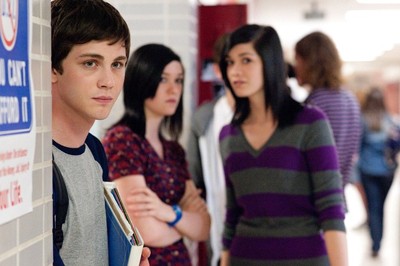 Since being published in 1999, Stephen Chbosky's "The Perks of Being a Wallflower" has frequently loomed near the top of the ALA's "most challenged books" chart for situations and themes centering on young outsiders, enough to make conservative foreheads sweat. Underneath a sincere exploration of sexuality, drug use, and the grief and depression that fuel suicide, this epistolary coming-of-age story is instead much closer to a comforting embrace than something to fret over; and, really, the "potentially banned" label only strengthens the resolve to seek out stories like this for their candor. The novel maintains a tricky balance while telling high-schooler Charlie's story, between hard-edged honesty and a message of reassurance, which might make it difficult to adapt to film in a way that values the sensibilities of its target audience. Luckily, Chbosky takes the challenge as screenwriter and director here, who welcomes us onto this island of misfit toys in a vivid, infectiously bittersweet adaptation that justly respects his intentions.
Since being published in 1999, Stephen Chbosky's "The Perks of Being a Wallflower" has frequently loomed near the top of the ALA's "most challenged books" chart for situations and themes centering on young outsiders, enough to make conservative foreheads sweat. Underneath a sincere exploration of sexuality, drug use, and the grief and depression that fuel suicide, this epistolary coming-of-age story is instead much closer to a comforting embrace than something to fret over; and, really, the "potentially banned" label only strengthens the resolve to seek out stories like this for their candor. The novel maintains a tricky balance while telling high-schooler Charlie's story, between hard-edged honesty and a message of reassurance, which might make it difficult to adapt to film in a way that values the sensibilities of its target audience. Luckily, Chbosky takes the challenge as screenwriter and director here, who welcomes us onto this island of misfit toys in a vivid, infectiously bittersweet adaptation that justly respects his intentions.
Set in the early '90s, the book consists of a series of letters written from the point-of-view of Charlie (Logan Lerman), an incoming freshman in high-school whose best friend committed suicide several months prior. Confiding in a stranger he refers to only as "friend", his letters -- more cathartic than journal entries, click-clacked on a typewriter or handwritten -- reveal his perspective as he tries to acclimate to the change in his life and participate on a social level. Chbosky's film does the same thing, but differently: it's almost as if the mysterious stranger on the other end has visualized his stories in a realistic, mature way as they're reading each letter, essentially presenting us with their interpretation of the setting, characters, and how unspoken events play out. More importantly, it provides a third-person outlook on Charlie's emotional and mental introversion instead of directly within the space of his head, and how it factors into the loss of his aunt Helen (Melanie Lynskey), the only person who's really "gotten" him in his life.
Charlie's experiences largely focus on his leap-of-faith relationship with a group of out-crowd graduating seniors, namely Patrick (Ezra Miller), an ostentatious guy dealing with being gay in a high-school environment, and Sam (Emma Watson), a pixie-haired girl with a past reputation of being a lush -- whom Charlie quickly becomes fond of. The awkwardness of their first encounter, over nachos at a football game, leads into the framework that The Perks of Being a Wallflower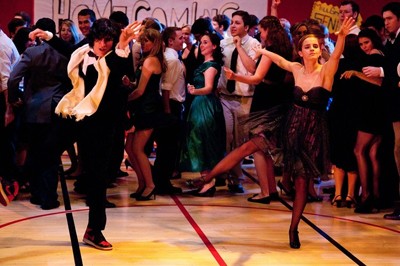 relishes: the off-kilter bond that forms as their social circle brings Charlie into their fold while learning to grasp his discomfited mannerisms, driven by discovering music and learning secrets at dimly-lit parties. Alongside that, they also show how Charlie incorporates his social awakening with his mental state outside their circle, namely with his older sister (Nina Dobrev), who dates an overbearing boy with a pony tail, and extracurricular lessons with his literature professor, Mr. Anderson (Paul Rudd), enhancing his writing ability by assigning him books to dissect.
relishes: the off-kilter bond that forms as their social circle brings Charlie into their fold while learning to grasp his discomfited mannerisms, driven by discovering music and learning secrets at dimly-lit parties. Alongside that, they also show how Charlie incorporates his social awakening with his mental state outside their circle, namely with his older sister (Nina Dobrev), who dates an overbearing boy with a pony tail, and extracurricular lessons with his literature professor, Mr. Anderson (Paul Rudd), enhancing his writing ability by assigning him books to dissect.
Hazy, resonant photography from Crazy, Stupid, Love cinematographer Andrew Dunn makes the events in The Perks of Being a Wallflower appear as if they're filtered memories of an antiquated time, which make Chbosky's film feel both nostalgic and, in a way, timeless. Contemporary and classic tunes popular in the '90s fill the air in scenes such as where the teenagers hop into a truck bed and glide through Pittsburgh's amber-lit Fort Pitt tunnel as if they're flying, embracing a sense of freedom and abandon as they move from one stage to the next. Scenes at school dances and after-parties feature verite-like movement that evokes authenticity, juxtaposed against a few subtle artistic flourishes illustrating Charlie's distorted reality -- either "under the influence" or just caught up in his tumultuous mental state -- that feature blurred motion and soul-thumping beats. It wouldn't be unreasonable to accuse these scenes of being romanticized, especially those where Charlie fixates on Sam, but that's the way recollections often work under a melancholy veil, even in instances where the world turns upside-down.
Chbosky understands the variety of his audience, from young adults currently enduring similar situations to mature viewers with those experiences long behind them, and he finds a way to take the book's edge down a notch so that the material retains its magnificence while avoiding some vulgarity. This isn't an easy task to accomplish, where Charlie's friends rope him into the corset-'n-garter world of Rocky Horror Picture Show and (without pressure) afford him the opportunity to get high. They're central components to this being an honest illustration of his metamorphosis, though, and Chbosky's inexperienced direction handles them in a surprisingly conscientious way, making Charlie a believable, sensitive sponge among his new environment. Naturally, the film lacks certain elements of his character's growth that are more articulate in the book, such as how Charlie uses the contextual knowledge he picks up from the novels he's assigned from Mr. Anderson, but their absence is filled with sequences that emphasize his desperation, intellect, and confusion in other ways.
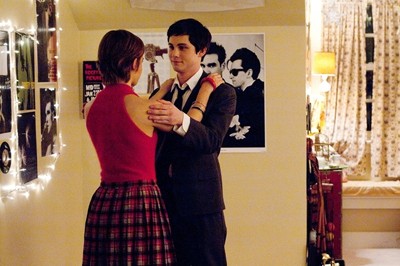 A huge part of the film's overarching success lies in the chemistry between the actors, and how this assortment of quasi-pariahs and authority figures interact with Logan Lerman's barefaced, heartrending complexity as Charlie. Ezra Miller takes the commanding presence he imparts on the likes of We Need to Talk About Kevin and tempers it with absorbing charisma as Patrick, adding depth and timbre to a gay young adult who's eager to socialize his freshman friend. Paul Rudd's subdued personality works exceptionally well as Mr. Anderson, an observant mentor or sorts, while Mae Whitman (Scott Pilgrim) and Erin Wilhelmi gracefully fill out the rest of their clique as Mary Elizabeth and Alice, whom embolden the background ambience with talk of horror films and philosophy. The wonder of The Perks of Being a Wallflower comes in the tender chemistry between Charlie and Sam, though, where a smashing typecast-bucking turn from Emma Watson meshes with Lerman's uncomfortable infatuation. They're consistent entities whom effortlessly support the film's ideas.
A huge part of the film's overarching success lies in the chemistry between the actors, and how this assortment of quasi-pariahs and authority figures interact with Logan Lerman's barefaced, heartrending complexity as Charlie. Ezra Miller takes the commanding presence he imparts on the likes of We Need to Talk About Kevin and tempers it with absorbing charisma as Patrick, adding depth and timbre to a gay young adult who's eager to socialize his freshman friend. Paul Rudd's subdued personality works exceptionally well as Mr. Anderson, an observant mentor or sorts, while Mae Whitman (Scott Pilgrim) and Erin Wilhelmi gracefully fill out the rest of their clique as Mary Elizabeth and Alice, whom embolden the background ambience with talk of horror films and philosophy. The wonder of The Perks of Being a Wallflower comes in the tender chemistry between Charlie and Sam, though, where a smashing typecast-bucking turn from Emma Watson meshes with Lerman's uncomfortable infatuation. They're consistent entities whom effortlessly support the film's ideas.
Chbosky's appreciation for the emotional fabric of his characters is observable from start to finish, which makes the times when he underscores harder themes in The Perks of Being a Wallflower -- abuse, grief, loving the wrong people -- all the more poignant. Flashbacks of repressed memories and quick shifts in the group's perception of Charlie escalate into an unpretentious emotional crescendo near the end, gathering the themes addressed across the story into a climax that successfully tiptoes the line between earnestness and melodrama. Part of what's being witnessed here is the metal-testing of a talented could-be author, whose experiences might become the thematic backbone to what he might pen himself in the future. This idea is vibrantly realized as Charlie's story comes to a close; the ache of disappointment, loss of innocence, and an inability to control things takes shape in a moving final expression that, while admittedly seeing things through rose-tinted glasses, articulately brings this reverent-yet-tweaked adaptation full-circle.
The Blu-ray:
Video and Audio:
The Perks of Being a Wallflower looks beautiful here, but it's the kind of beautiful that doesn't make a big deal about itself. Underneath the hazy, grainy appearance that gives the 35mm cinematography a dreamy outlook, something that's been present in both the trailers and theatrical screeners I've viewed, the 1.78:1-framed image from Summit/Lionsgate (slightly tweaked from its 1.85:1 theatrical distribution) reveals some slyly gorgeous textures and fine details when viewed with a discerning eye: the fur and ribbed material of Sam's holiday sweater, the weave of stockings during a Rocky Horror performance, the strokes of pencil scribbles and the ink of typewriter marks. Flush and skin creases during close-ups embrace a natural beauty, while the warmth of amber-orange lighting evokes a rich, warm mood both through the tunnel and during interior shots around the suburban homes and parties. The softness and heavy grain occasionally extend beyond those intentions, and erratic black levels during extremely dark scenes isn't pleasing (such as at the park), but there's plenty of involving splendor to be found here if you look in the right place. For its intentions, it looks rather good.
The 5.1 Master Audio track has plenty of vigor to it as well, though not without a few intermittent flaws. Nothing's wrong with the music, at all: the depth and richness of songs from David Bowie and The Smiths, as well as elements from the film's original score, create a resounding swell of tunes that wraps those listening up for the intended, nostalgic, emotionally-overt effect. Conversations in homes, at diners, and in parking lots are discernibly engaging, and slight sound effects, from the click of a typewriter to the sound of coffee cups tapping on dining tables, are convincingly ambient against the design. The issues arise during a few louder sequences, notably at the football game; Patrick's cheering, as well as some of the dialogue around the scene, really scrape at the top of the sound design, creating a noticeable rasp effect that reappears in a few other spots. Those are more than tolerable, though, when everything else sounds as pleasing as it does here. English and Spanish subtitles can be popped on with the film.
Special Features:
Supplements of substance aren't in high number here, so it's up to the pair of commentaries to fill that void. They're mostly successful. First, the solo Audio Commentary with Stephen Chbosky is something fans of the book will largely be interesting in checking out, since, y'know, it's the author offering his perspective on an adaptation of his work to the screen -- and how he, as creator, made certain decisions about what to preserve or change. He has plenty of anecdotes to share; he reveals his Emma Watson story, how Nina Dobrev audition for the film, and how he derived inspiration from the likes of Dead Poets Society. He also point-blank states tha he knew the movie was never going to be the book, though he, unfortunately, doesn't discuss the differences between the book and film to great extent (you'll have to check out the deleted scenes for that). He's a bit exaggerated in his praise, and he levies more of a " message" in this track than I'd like, but I enjoyed listening to his appreciative narrative and insights during the film.
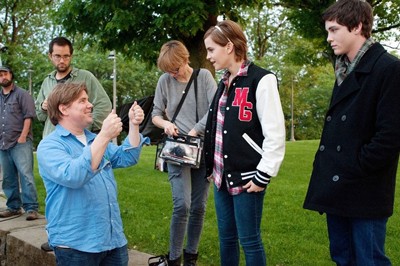 The Cast and Director's Commentary greets us with hums and exaggerated breathing exercises, followed by their fearless leader revealing that this commentary was done via satellite across three locations (LA, NY, London). Chbosky does a good job of "mediating" the discussion, but it's mostly what you'd expect from a large crowd: fun-to-hear anecdotes and sweeping comments that are inherently lighter on deeper insight on the film's construction, with Ezra Miller and Mae Whitman taking the helm with humor. Emma Watson's fanbase will enjoy hearing where she hung her letter-jacket, it's great to hear about Chbosky forcing a certain scene to be done seventeen times, and there's some crafty religious allegory scattered about (that actually generates some awkward silence). Chbosky treads much of the same ground for the bits of insights in this, but you'll get a kick out of hearing the participants ... participate.
The Cast and Director's Commentary greets us with hums and exaggerated breathing exercises, followed by their fearless leader revealing that this commentary was done via satellite across three locations (LA, NY, London). Chbosky does a good job of "mediating" the discussion, but it's mostly what you'd expect from a large crowd: fun-to-hear anecdotes and sweeping comments that are inherently lighter on deeper insight on the film's construction, with Ezra Miller and Mae Whitman taking the helm with humor. Emma Watson's fanbase will enjoy hearing where she hung her letter-jacket, it's great to hear about Chbosky forcing a certain scene to be done seventeen times, and there's some crafty religious allegory scattered about (that actually generates some awkward silence). Chbosky treads much of the same ground for the bits of insights in this, but you'll get a kick out of hearing the participants ... participate.
Fans of the book better brace themselves, because the eleven Deleted Scenes (23:11, HD), available with commentary, are going to make them clench their fists. Some of them are throwaway sequences that really would've felt superfluous, but there are others -- in particular, one involving an abortion and another involving a certain poem -- that'll disappoint those who'd prefer for them to be in the movie for completion's sake, made even worse since they're fairly well done. This is the area where you'll actually hear some of Chbosky's best comments about the film in comparison to the book, and exactly why he elected against including them in his final cut (his reasoning really is well-justified). The Dailies (7:04, HD) also arrive with comments from Chbosky as well, including some warm comments about Emma Watson about her "flying" scene. We've also got a brief press-kit featurette entitled Best Summer Ever (5:00, HD) and a Theatrical Trailer (2:27, HD), but that's what we're working with here on a substantive level.
Final Thoughts:
I'll never understand precisely why The Perks of Being a Wallflower didn't gain more traction, but hopefully Stephen Chbosky's adaptation of his own novel will earn a larger following on home-video. This reverent but refreshingly modified take on the book tracks freshman introvert Charlie as he endures his first year of high school while coping with the suicide of his best friend (as well as his own mental issues), leading him into the embrace of a group of unpopular kids who understand and properly interpret his social nature -- especially Sam, the object of his affection. Themes of grief, misguided love, self-discovery and moving on from the things that haunt us drive this story through the suburbs of Pittsburgh, where the bond that forms between Charlie and his friends strengthen over mix tapes and enlightening parties. It's a straightforward coming-of-age tale that's made less straightforward by the complications that arise with Charlie's issues, and it becomes a poignant, charming expression of everything it stands for as the secrets of these outsiders rise to the surface. Lionsgate's Blu-ray offers a fetching, elegant, if flawed audiovisual presentation, as well as a slate of strong supplements that include two commentaries and must-watch deleted scenes. Highly Recommended.
Thomas Spurlin, Staff Reviewer -- DVDTalk Reviews | Personal Blog/Site
 Since being published in 1999, Stephen Chbosky's "The Perks of Being a Wallflower" has frequently loomed near the top of the ALA's "most challenged books" chart for situations and themes centering on young outsiders, enough to make conservative foreheads sweat. Underneath a sincere exploration of sexuality, drug use, and the grief and depression that fuel suicide, this epistolary coming-of-age story is instead much closer to a comforting embrace than something to fret over; and, really, the "potentially banned" label only strengthens the resolve to seek out stories like this for their candor. The novel maintains a tricky balance while telling high-schooler Charlie's story, between hard-edged honesty and a message of reassurance, which might make it difficult to adapt to film in a way that values the sensibilities of its target audience. Luckily, Chbosky takes the challenge as screenwriter and director here, who welcomes us onto this island of misfit toys in a vivid, infectiously bittersweet adaptation that justly respects his intentions.
Since being published in 1999, Stephen Chbosky's "The Perks of Being a Wallflower" has frequently loomed near the top of the ALA's "most challenged books" chart for situations and themes centering on young outsiders, enough to make conservative foreheads sweat. Underneath a sincere exploration of sexuality, drug use, and the grief and depression that fuel suicide, this epistolary coming-of-age story is instead much closer to a comforting embrace than something to fret over; and, really, the "potentially banned" label only strengthens the resolve to seek out stories like this for their candor. The novel maintains a tricky balance while telling high-schooler Charlie's story, between hard-edged honesty and a message of reassurance, which might make it difficult to adapt to film in a way that values the sensibilities of its target audience. Luckily, Chbosky takes the challenge as screenwriter and director here, who welcomes us onto this island of misfit toys in a vivid, infectiously bittersweet adaptation that justly respects his intentions. Set in the early '90s, the book consists of a series of letters written from the point-of-view of Charlie (Logan Lerman), an incoming freshman in high-school whose best friend committed suicide several months prior. Confiding in a stranger he refers to only as "friend", his letters -- more cathartic than journal entries, click-clacked on a typewriter or handwritten -- reveal his perspective as he tries to acclimate to the change in his life and participate on a social level. Chbosky's film does the same thing, but differently: it's almost as if the mysterious stranger on the other end has visualized his stories in a realistic, mature way as they're reading each letter, essentially presenting us with their interpretation of the setting, characters, and how unspoken events play out. More importantly, it provides a third-person outlook on Charlie's emotional and mental introversion instead of directly within the space of his head, and how it factors into the loss of his aunt Helen (Melanie Lynskey), the only person who's really "gotten" him in his life.
Charlie's experiences largely focus on his leap-of-faith relationship with a group of out-crowd graduating seniors, namely Patrick (Ezra Miller), an ostentatious guy dealing with being gay in a high-school environment, and Sam (Emma Watson), a pixie-haired girl with a past reputation of being a lush -- whom Charlie quickly becomes fond of. The awkwardness of their first encounter, over nachos at a football game, leads into the framework that The Perks of Being a Wallflower
 relishes: the off-kilter bond that forms as their social circle brings Charlie into their fold while learning to grasp his discomfited mannerisms, driven by discovering music and learning secrets at dimly-lit parties. Alongside that, they also show how Charlie incorporates his social awakening with his mental state outside their circle, namely with his older sister (Nina Dobrev), who dates an overbearing boy with a pony tail, and extracurricular lessons with his literature professor, Mr. Anderson (Paul Rudd), enhancing his writing ability by assigning him books to dissect.
relishes: the off-kilter bond that forms as their social circle brings Charlie into their fold while learning to grasp his discomfited mannerisms, driven by discovering music and learning secrets at dimly-lit parties. Alongside that, they also show how Charlie incorporates his social awakening with his mental state outside their circle, namely with his older sister (Nina Dobrev), who dates an overbearing boy with a pony tail, and extracurricular lessons with his literature professor, Mr. Anderson (Paul Rudd), enhancing his writing ability by assigning him books to dissect. Hazy, resonant photography from Crazy, Stupid, Love cinematographer Andrew Dunn makes the events in The Perks of Being a Wallflower appear as if they're filtered memories of an antiquated time, which make Chbosky's film feel both nostalgic and, in a way, timeless. Contemporary and classic tunes popular in the '90s fill the air in scenes such as where the teenagers hop into a truck bed and glide through Pittsburgh's amber-lit Fort Pitt tunnel as if they're flying, embracing a sense of freedom and abandon as they move from one stage to the next. Scenes at school dances and after-parties feature verite-like movement that evokes authenticity, juxtaposed against a few subtle artistic flourishes illustrating Charlie's distorted reality -- either "under the influence" or just caught up in his tumultuous mental state -- that feature blurred motion and soul-thumping beats. It wouldn't be unreasonable to accuse these scenes of being romanticized, especially those where Charlie fixates on Sam, but that's the way recollections often work under a melancholy veil, even in instances where the world turns upside-down.
Chbosky understands the variety of his audience, from young adults currently enduring similar situations to mature viewers with those experiences long behind them, and he finds a way to take the book's edge down a notch so that the material retains its magnificence while avoiding some vulgarity. This isn't an easy task to accomplish, where Charlie's friends rope him into the corset-'n-garter world of Rocky Horror Picture Show and (without pressure) afford him the opportunity to get high. They're central components to this being an honest illustration of his metamorphosis, though, and Chbosky's inexperienced direction handles them in a surprisingly conscientious way, making Charlie a believable, sensitive sponge among his new environment. Naturally, the film lacks certain elements of his character's growth that are more articulate in the book, such as how Charlie uses the contextual knowledge he picks up from the novels he's assigned from Mr. Anderson, but their absence is filled with sequences that emphasize his desperation, intellect, and confusion in other ways.
 A huge part of the film's overarching success lies in the chemistry between the actors, and how this assortment of quasi-pariahs and authority figures interact with Logan Lerman's barefaced, heartrending complexity as Charlie. Ezra Miller takes the commanding presence he imparts on the likes of We Need to Talk About Kevin and tempers it with absorbing charisma as Patrick, adding depth and timbre to a gay young adult who's eager to socialize his freshman friend. Paul Rudd's subdued personality works exceptionally well as Mr. Anderson, an observant mentor or sorts, while Mae Whitman (Scott Pilgrim) and Erin Wilhelmi gracefully fill out the rest of their clique as Mary Elizabeth and Alice, whom embolden the background ambience with talk of horror films and philosophy. The wonder of The Perks of Being a Wallflower comes in the tender chemistry between Charlie and Sam, though, where a smashing typecast-bucking turn from Emma Watson meshes with Lerman's uncomfortable infatuation. They're consistent entities whom effortlessly support the film's ideas.
A huge part of the film's overarching success lies in the chemistry between the actors, and how this assortment of quasi-pariahs and authority figures interact with Logan Lerman's barefaced, heartrending complexity as Charlie. Ezra Miller takes the commanding presence he imparts on the likes of We Need to Talk About Kevin and tempers it with absorbing charisma as Patrick, adding depth and timbre to a gay young adult who's eager to socialize his freshman friend. Paul Rudd's subdued personality works exceptionally well as Mr. Anderson, an observant mentor or sorts, while Mae Whitman (Scott Pilgrim) and Erin Wilhelmi gracefully fill out the rest of their clique as Mary Elizabeth and Alice, whom embolden the background ambience with talk of horror films and philosophy. The wonder of The Perks of Being a Wallflower comes in the tender chemistry between Charlie and Sam, though, where a smashing typecast-bucking turn from Emma Watson meshes with Lerman's uncomfortable infatuation. They're consistent entities whom effortlessly support the film's ideas. Chbosky's appreciation for the emotional fabric of his characters is observable from start to finish, which makes the times when he underscores harder themes in The Perks of Being a Wallflower -- abuse, grief, loving the wrong people -- all the more poignant. Flashbacks of repressed memories and quick shifts in the group's perception of Charlie escalate into an unpretentious emotional crescendo near the end, gathering the themes addressed across the story into a climax that successfully tiptoes the line between earnestness and melodrama. Part of what's being witnessed here is the metal-testing of a talented could-be author, whose experiences might become the thematic backbone to what he might pen himself in the future. This idea is vibrantly realized as Charlie's story comes to a close; the ache of disappointment, loss of innocence, and an inability to control things takes shape in a moving final expression that, while admittedly seeing things through rose-tinted glasses, articulately brings this reverent-yet-tweaked adaptation full-circle.
The Blu-ray:
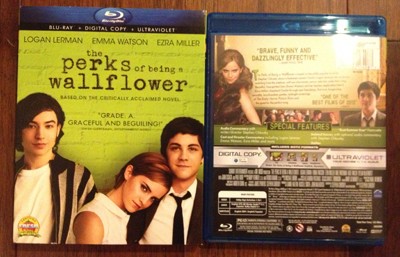 | 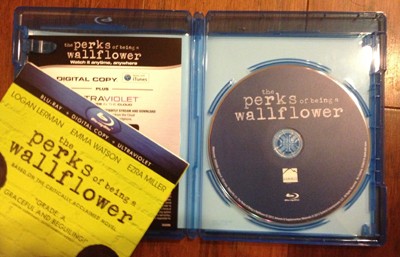 |
Video and Audio:
The Perks of Being a Wallflower looks beautiful here, but it's the kind of beautiful that doesn't make a big deal about itself. Underneath the hazy, grainy appearance that gives the 35mm cinematography a dreamy outlook, something that's been present in both the trailers and theatrical screeners I've viewed, the 1.78:1-framed image from Summit/Lionsgate (slightly tweaked from its 1.85:1 theatrical distribution) reveals some slyly gorgeous textures and fine details when viewed with a discerning eye: the fur and ribbed material of Sam's holiday sweater, the weave of stockings during a Rocky Horror performance, the strokes of pencil scribbles and the ink of typewriter marks. Flush and skin creases during close-ups embrace a natural beauty, while the warmth of amber-orange lighting evokes a rich, warm mood both through the tunnel and during interior shots around the suburban homes and parties. The softness and heavy grain occasionally extend beyond those intentions, and erratic black levels during extremely dark scenes isn't pleasing (such as at the park), but there's plenty of involving splendor to be found here if you look in the right place. For its intentions, it looks rather good.
The 5.1 Master Audio track has plenty of vigor to it as well, though not without a few intermittent flaws. Nothing's wrong with the music, at all: the depth and richness of songs from David Bowie and The Smiths, as well as elements from the film's original score, create a resounding swell of tunes that wraps those listening up for the intended, nostalgic, emotionally-overt effect. Conversations in homes, at diners, and in parking lots are discernibly engaging, and slight sound effects, from the click of a typewriter to the sound of coffee cups tapping on dining tables, are convincingly ambient against the design. The issues arise during a few louder sequences, notably at the football game; Patrick's cheering, as well as some of the dialogue around the scene, really scrape at the top of the sound design, creating a noticeable rasp effect that reappears in a few other spots. Those are more than tolerable, though, when everything else sounds as pleasing as it does here. English and Spanish subtitles can be popped on with the film.
Special Features:
Supplements of substance aren't in high number here, so it's up to the pair of commentaries to fill that void. They're mostly successful. First, the solo Audio Commentary with Stephen Chbosky is something fans of the book will largely be interesting in checking out, since, y'know, it's the author offering his perspective on an adaptation of his work to the screen -- and how he, as creator, made certain decisions about what to preserve or change. He has plenty of anecdotes to share; he reveals his Emma Watson story, how Nina Dobrev audition for the film, and how he derived inspiration from the likes of Dead Poets Society. He also point-blank states tha he knew the movie was never going to be the book, though he, unfortunately, doesn't discuss the differences between the book and film to great extent (you'll have to check out the deleted scenes for that). He's a bit exaggerated in his praise, and he levies more of a " message" in this track than I'd like, but I enjoyed listening to his appreciative narrative and insights during the film.
 The Cast and Director's Commentary greets us with hums and exaggerated breathing exercises, followed by their fearless leader revealing that this commentary was done via satellite across three locations (LA, NY, London). Chbosky does a good job of "mediating" the discussion, but it's mostly what you'd expect from a large crowd: fun-to-hear anecdotes and sweeping comments that are inherently lighter on deeper insight on the film's construction, with Ezra Miller and Mae Whitman taking the helm with humor. Emma Watson's fanbase will enjoy hearing where she hung her letter-jacket, it's great to hear about Chbosky forcing a certain scene to be done seventeen times, and there's some crafty religious allegory scattered about (that actually generates some awkward silence). Chbosky treads much of the same ground for the bits of insights in this, but you'll get a kick out of hearing the participants ... participate.
The Cast and Director's Commentary greets us with hums and exaggerated breathing exercises, followed by their fearless leader revealing that this commentary was done via satellite across three locations (LA, NY, London). Chbosky does a good job of "mediating" the discussion, but it's mostly what you'd expect from a large crowd: fun-to-hear anecdotes and sweeping comments that are inherently lighter on deeper insight on the film's construction, with Ezra Miller and Mae Whitman taking the helm with humor. Emma Watson's fanbase will enjoy hearing where she hung her letter-jacket, it's great to hear about Chbosky forcing a certain scene to be done seventeen times, and there's some crafty religious allegory scattered about (that actually generates some awkward silence). Chbosky treads much of the same ground for the bits of insights in this, but you'll get a kick out of hearing the participants ... participate. Fans of the book better brace themselves, because the eleven Deleted Scenes (23:11, HD), available with commentary, are going to make them clench their fists. Some of them are throwaway sequences that really would've felt superfluous, but there are others -- in particular, one involving an abortion and another involving a certain poem -- that'll disappoint those who'd prefer for them to be in the movie for completion's sake, made even worse since they're fairly well done. This is the area where you'll actually hear some of Chbosky's best comments about the film in comparison to the book, and exactly why he elected against including them in his final cut (his reasoning really is well-justified). The Dailies (7:04, HD) also arrive with comments from Chbosky as well, including some warm comments about Emma Watson about her "flying" scene. We've also got a brief press-kit featurette entitled Best Summer Ever (5:00, HD) and a Theatrical Trailer (2:27, HD), but that's what we're working with here on a substantive level.
Final Thoughts:
I'll never understand precisely why The Perks of Being a Wallflower didn't gain more traction, but hopefully Stephen Chbosky's adaptation of his own novel will earn a larger following on home-video. This reverent but refreshingly modified take on the book tracks freshman introvert Charlie as he endures his first year of high school while coping with the suicide of his best friend (as well as his own mental issues), leading him into the embrace of a group of unpopular kids who understand and properly interpret his social nature -- especially Sam, the object of his affection. Themes of grief, misguided love, self-discovery and moving on from the things that haunt us drive this story through the suburbs of Pittsburgh, where the bond that forms between Charlie and his friends strengthen over mix tapes and enlightening parties. It's a straightforward coming-of-age tale that's made less straightforward by the complications that arise with Charlie's issues, and it becomes a poignant, charming expression of everything it stands for as the secrets of these outsiders rise to the surface. Lionsgate's Blu-ray offers a fetching, elegant, if flawed audiovisual presentation, as well as a slate of strong supplements that include two commentaries and must-watch deleted scenes. Highly Recommended.
|
| Popular Reviews |
| Sponsored Links |
|
|
| Sponsored Links |
|
|
| Release List | Reviews | Shop | Newsletter | Forum | DVD Giveaways | Blu-Ray | Advertise |
|
Copyright 2024 DVDTalk.com All Rights Reserved. Legal Info, Privacy Policy, Terms of Use,
Manage Preferences,
Your Privacy Choices | |||||||









